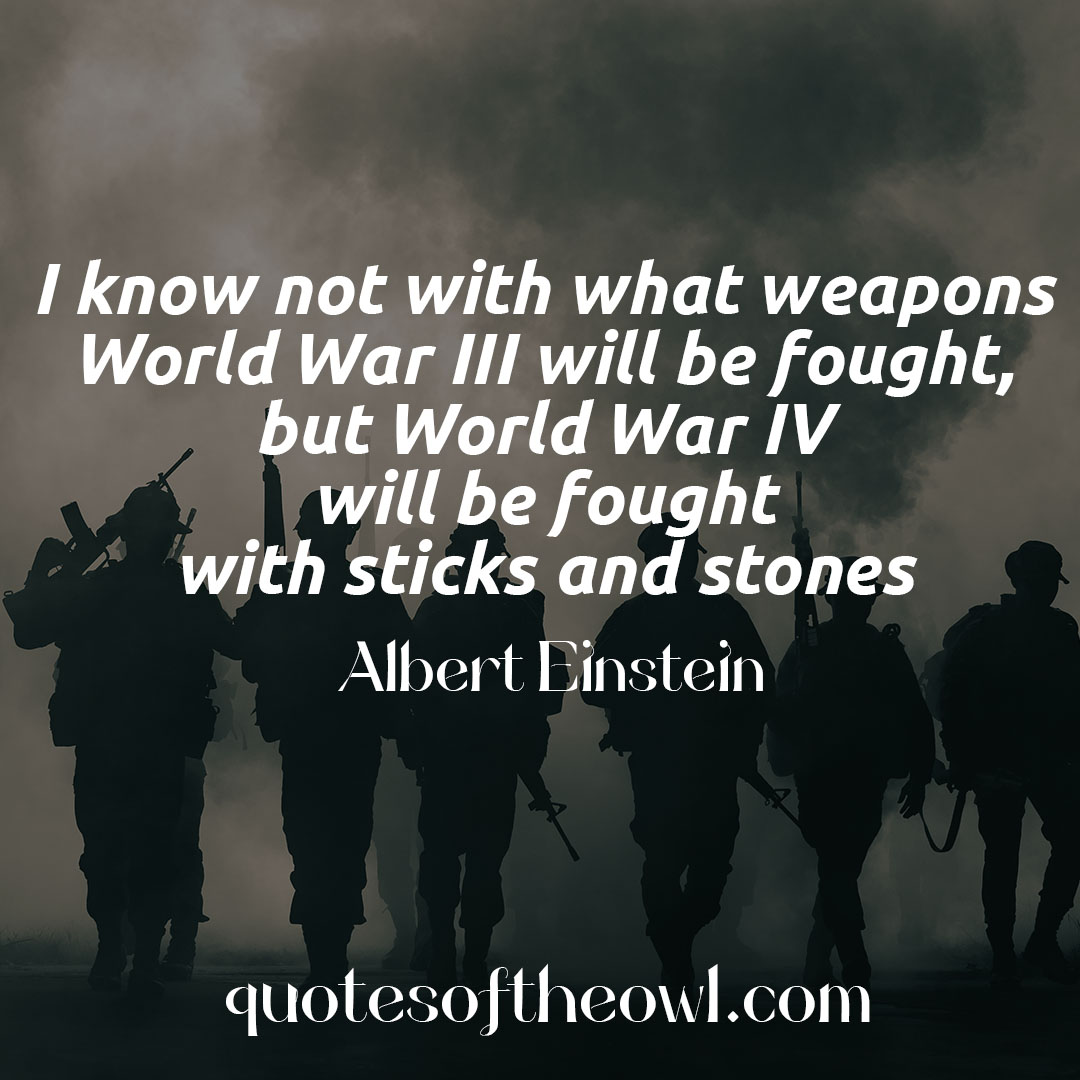What is the meaning of Albert Einstein’s Quote: “I know not with what weapons World War III will be fought, but World War IV will be fought with sticks and stones”?
Albert Einstein is undoubtedly one of the most brilliant minds in history. His groundbreaking work in physics changed the world and helped pave the way for numerous technological advancements. However, his contributions to society go far beyond the realm of science. Einstein was a deep thinker who had a unique perspective on life and the world around him. He is known for many quotes that have become part of popular culture, but perhaps none are as thought-provoking as his prediction about the future of war. In this article, we will explore the meaning behind Albert Einstein’s quote, “I know not with what weapons World War III will be fought, but World War IV will be fought with sticks and stones.”
The context of the quote
Einstein made his famous quote about the weapons of World War III in 1949, just a few years after the end of World War II. This was a time of great tension between the United States and the Soviet Union, and many people feared that the world was on the brink of another devastating war. In this context, Einstein’s words carried a great deal of weight and were seen as a warning about the dangers of nuclear weapons.
The meaning of the quote
At first glance, Einstein’s quote may seem cryptic or even contradictory. How can a war be fought with sticks and stones when we have nuclear weapons that are far more powerful? However, when we look at the quote in the context of Einstein’s other writings and speeches, we can begin to understand what he meant.
Einstein believed that war was a deeply destructive force that threatened the very survival of humanity. He saw the development of nuclear weapons as a turning point in human history, one that made the possibility of global destruction all too real. In his view, the only way to prevent this outcome was to completely eliminate nuclear weapons and work towards a world without war.
The quote “I know not with what weapons World War III will be fought” refers to the uncertainty surrounding the future of war. Einstein recognized that the world was changing rapidly and that new technologies were emerging that could fundamentally alter the nature of conflict. He did not know what form these weapons would take, but he understood that they would be devastating.
The second part of the quote, “but World War IV will be fought with sticks and stones,” is a powerful statement about the consequences of war. Einstein believed that if humanity continued on its current path, it would eventually destroy itself through warfare. The image of a future war fought with primitive weapons like sticks and stones is a stark reminder of the horrors of conflict and the need for peace.
The implications of the quote
The implications of the quote also extend to the role of technology in warfare. Einstein recognized that technology can be a double-edged sword, capable of both great good and great harm. He saw the development of nuclear weapons as a prime example of this, and he believed that technological progress alone was not enough to ensure peace. Instead, he argued that we need to cultivate a culture of peace and work towards a world without war.
Another implication of the quote is the importance of foresight and planning. Einstein’s words remind us that we cannot predict the future with certainty, but we can prepare for it. By anticipating the dangers of war and taking proactive steps to prevent it, we can increase the likelihood of a peaceful and prosperous future.
The relevance of the quote today
Despite being over 70 years old, Einstein’s quote remains as relevant as ever. The world is still grappling with the threat of nuclear war, and new technologies like cyberwarfare and artificial intelligence have emerged as potential sources of conflict. In this context, Einstein’s warning about the dangers of war and the importance of peace is more important than ever.
The quote is also a reminder that the future is not predetermined. We have the power to shape our own destiny and choose the path we want to take. If we want to avoid a future war fought with sticks and stones, we must take action now to prevent it.
Conclusion
In conclusion, Albert Einstein’s quote about the weapons of World War III is a powerful reminder of the dangers of war and the importance of peace. His words challenge us to think deeply about the future of humanity and the role of technology in shaping it. If we take action now to prevent war and promote peace, we can create a brighter and more prosperous future for all.
Check out our collection of Albert Einstein quotes for further inspiration and insights.

